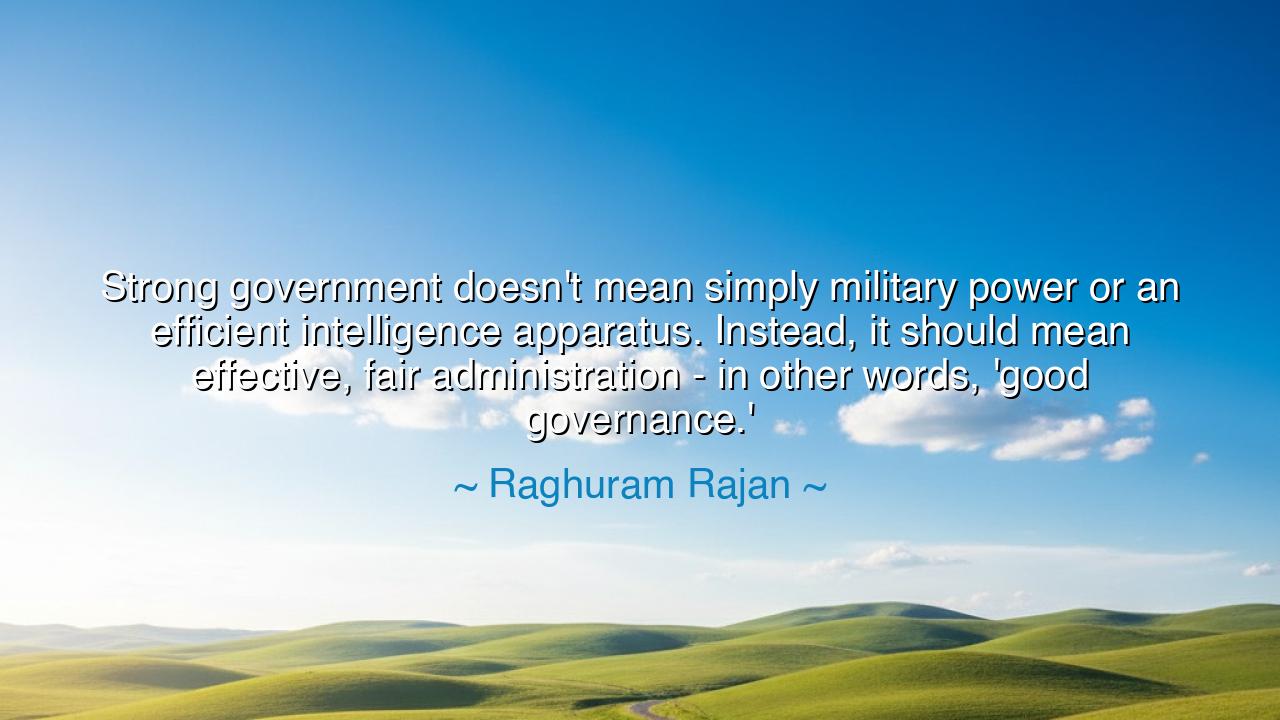
Strong government doesn't mean simply military power or an
Strong government doesn't mean simply military power or an efficient intelligence apparatus. Instead, it should mean effective, fair administration - in other words, 'good governance.'






The words of Raghuram Rajan — “Strong government doesn’t mean simply military power or an efficient intelligence apparatus. Instead, it should mean effective, fair administration — in other words, ‘good governance.’” — shine with the quiet fire of truth, a truth that rulers across the ages have too often forgotten. In this saying lies a deep and timeless wisdom: that strength is not measured by force, but by justice; that the might of a nation lies not in the fear it commands, but in the trust it earns. The sword may secure obedience, but only good governance secures loyalty. For no empire, however powerful its armies, can stand long upon the trembling ground of injustice.
Rajan, an economist and former governor of the Reserve Bank of India, spoke these words in a time when nations were confusing control with competence, and authority with wisdom. His voice, though modern, carries the cadence of the ancients — of philosophers and statesmen who understood that the strength of a state is moral before it is material. He sought to remind the world that true governance is stewardship, not domination; that it is the art of balancing power with mercy, ambition with restraint, and law with compassion. A government that rules by fear may seem strong in the moment, but it rots from within, for fear is the poorest cement of civilization.
The ancients knew this truth well. Emperor Ashoka of India, once a conqueror drenched in blood, learned it after the devastating war of Kalinga. He had wielded the full might of his army and crushed his enemies utterly — yet when he walked among the ruins, he saw not victory, but the ashes of humanity. His heart turned, and he declared that the greatness of a ruler does not lie in conquest but in compassion. He laid down the sword and built instead a realm governed by fairness, peace, and moral law. His name endures not because he ruled with power, but because he ruled with justice. That is what Rajan means when he speaks of “good governance” — the strength that comes from righteousness, not oppression.
History is full of rulers who learned this lesson too late. The mighty empires of Rome and China, of Spain and the Ottomans, all believed at their height that power was permanence — that soldiers and spies could preserve what fairness could not. Yet the walls of every empire, however tall, crumbled when corruption spread and justice failed. The wise have always said that the state is like a tree: its roots are justice, its trunk is law, and its leaves are prosperity. When the roots rot, no matter how tall the branches reach toward the sky, the fall is certain.
Rajan’s words call us to remember that the strength of a government lies in its integrity. The ruler who listens to the cries of the poor is mightier than the general who commands an army. The minister who enforces laws with fairness is more feared by the wicked than the sword itself. A nation built upon trust, transparency, and accountability can withstand any storm, while one built upon secrecy and force will collapse beneath its own weight. The measure of power is not how easily one can command obedience, but how willingly the people follow, knowing they are governed with justice.
We can see this even in our own age. Nations that cherish freedom, equality, and fairness — where leaders serve rather than rule — grow strong in spirit, attracting talent, trade, and loyalty. But those that choose the path of fear and repression may seem powerful for a season, yet their people grow restless, their economies hollow, and their glory fades. Good governance is the quiet strength that endures; tyranny is the loud power that burns itself out.
So let this teaching be remembered by all who lead, whether in nation, business, or home: strength without fairness is weakness in disguise. Govern with justice. Rule with humility. Seek not to control others, but to serve them well. Let your decisions be guided not by pride, but by the good of all. For in the end, it is not the fortresses or the fleets that sustain a people — it is their faith that those who govern them do so rightly.
And thus, O listener, carry this wisdom into your heart: a strong government is not the one that commands the loudest, but the one that listens the most deeply. Build justice where you can, act with fairness where you stand, and remember that every act of integrity, no matter how small, strengthens the foundations of the world. For the true test of power is not how long it endures, but how well it serves. This is the essence of good governance — and the truest form of strength.






AAdministratorAdministrator
Welcome, honored guests. Please leave a comment, we will respond soon